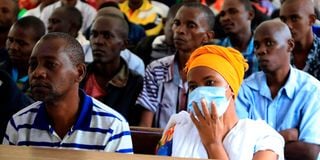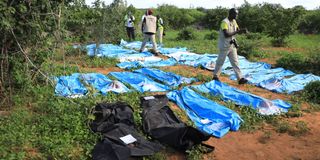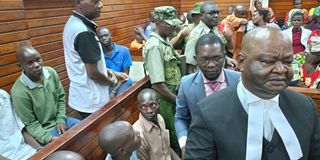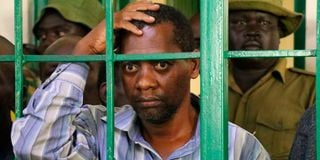Premium
Why court advised DPP to reduce murder charges against Shakahola suspects

Pastor Paul Mackenzie and his alleged 29 associates at the Shanzu Law Courts during the mention of the case in this file photo.
What you need to know:
- While noting that the decision to charge and the number of counts in a charge sheet or information lies with the Office of the Director of Public Prosecution (ODPP), the judge argued that engaging in a lengthy trial, which is likely to lead to confusion of the prosecution case, will certainly not be in the public interest or justice.
- Additionally, Justice Thande noted that the impracticality of managing such a trial and the inconvenience and embarrassment likely to be caused to the defence, the prosecution, and the court cannot be ignored or disregarded.
The High Court has advised that prosecuting controversial preacher Paul Mackenzie and his co-accused with 191 counts of murder is not in the public interest or the interest of the administration of justice.
Malindi High Court Judge Mugure Thande observed that it would be virtually impractical to manage this kind of trial, which is likely to be prolonged.
“The convolution of the matter will also be of unimaginable proportions. An overloaded charge will clearly occasion delay in the conclusion of the trial. This will lead to a violation of the right of the accused to a fair hearing as guaranteed under the law, and in particular, the right to an expedited hearing,” said the Judge.
While noting that the decision to charge and the number of counts in a charge sheet or information lies with the Office of the Director of Public Prosecution (ODPP), the judge argued that engaging in a lengthy trial, which is likely to lead to confusion of the prosecution case, will certainly not be in the public interest or justice.
Additionally, Justice Thande noted that the impracticality of managing such a trial and the inconvenience and embarrassment likely to be caused to the defence, the prosecution, and the court cannot be ignored or disregarded.
“Having one very long trial will be extremely burdensome not only to the court but also to the prosecution as well as the defence. The question that assails the mind of the court is, what will the judgment in a case with 31 accused persons facing 191 counts even look like?" the judge posed.
Therefore, the judge advised that the reasonable thing to do in the interests of all concerned is for the prosecution to withdraw some counts in the information and remain with a manageable number.
The judge noted that the withdrawn charges may be revived if necessary, adding the "interests of justice will be better served this way."
While acknowledging the independence of ODPP, Justice Thande noted that the law requires the holder of that office to have regard for the public interest, the interests of the administration of justice and the need to prevent and avoid abuse of the legal process in exercising the powers conferred by the Constitution.
“In the end, and in view of the foregoing, I do concur with the defence that the charge sheet containing 191 counts is clearly overloaded. I accordingly direct the ODPP to file an amended information with reduced counts not exceeding 12,” said the judge.
Many counts
Justice Thande also observed that charging an accused person with many counts in one charge sheet is frowned upon because of the potential prejudice that may be occasioned by such, adding that overloading information militates against the public interest and the interests of justice.
“This court vividly recalls the length of time it took just to read out all the 191 charges during plea taking by the accused. It took two court assistants helping each other. One can only imagine how long it will take for evidence to be adduced against each of the 31 Accused, and recorded in respect of all the 191 charges,” said the judge.
However, the court okayed the state to prosecute Mackenzie and his group for murdering an unnamed person whose gender is also not known.
The law provides that a charge or information shall be sufficient if it contains a statement of the specific offence or offences facing an accused person and particulars as may be necessary for giving reasonable information as to the nature of the offence.
It, therefore, means that a charge or information without the above details shall be defective.
Here, Justice Thande ruled that her reading of the information, as drawn, clearly shows that the accused faces murder charges, particulars indicate the period within which the offences were allegedly committed and indicate the victim of the alleged offence by name or by reference.
Defective charge
According to the Judge, the mere fact that the period in which the offence was committed spans from January 2021 to September 2023 or that some of the alleged victims have not been identified by name does not, in her view, render the charge defective.
“The details in each count contain sufficient detail to enable answering the same. When the information was read to Mackenzie and his accomplice, they all responded by pleading not guilty. This is indicative that they are sufficiently aware of and understand the charges they face and the nature thereof,” said the judge.
Section 135 of the Criminal Procedure Code (CPC) provides that any offences, whether felonies or misdemeanours, may be charged together in the same charge or information if the offences charged are founded on the same facts or form or are part of a series of offences of the same or a similar character.

Bodies exhumed from mass graves in Shakahola forest, Kilifi County on May 12, 2023.
It further provides that where more than one offence is charged in a charge or information, a description of each offence so charged shall be set out in a separate paragraph of the charge or information called a count.
“The charges herein are of murder and are founded on the same facts. Further, the information contains a description of each count in a separate paragraph. Accordingly, the law in this regard has been complied with,” said the judge.
Justice Thande added that the charges as drawn comply with the law and that nothing has been placed before the court to demonstrate that the accused do not understand the nature of the charges against them or are confused.
“As such, Mackenzie and his group will be in a position to mount an appropriate defence. This being the case, the charges as drawn and the particulars as set out in the information will not cause any prejudice to them,” said the judge.
But the judge noted that it will be upon the prosecution, at the end of the day, to place evidence before the court to prosecute the case.

Pastor Paul Mackenzie with 94 others at the Mombasa Law Courts on January 23, 2024 where they pleaded not guilty to manslaughter charges.
Mackenzie and his associates were in January this year charged with the murder of 191 children.
The charge sheet reads that on diverse dates between January 2021 and September 2023, the suspects jointly murdered Nathan Mathu, Evabra Dito, Seth Ngala, Sifa Edison and 187 others in the Shakahola area, Kilifi County.
They all pleaded not guilty to these charges.
However, after taking a plea, Mackenzie and his associates objected to the offences, lamenting that the charge sheet was defective and that the number of counts numbering 191 in the charge sheet was oppressive and unconstitutional.
“The number of charges complained of will subject us to delayed determination of the case and in contravention of the principles of fair hearing as is enshrined in the constitution,” they said through their advocates Wycliffe Makasembo and James Mouko.
They further argued that the charge sheet running into 298 pages and containing 191 charges of murder of known and unknown persons is defective and overloaded.
The advocates argued that the ODPP must, in the discharge of his mandate, ensure that the criminal process is not abused and must draw charges against accused persons which accord with the facts, reflect the offence and conform to the provisions of the law.

Pastor Paul Mackenzie appears before Shanzu Law Courts on June 2, 2023.
“The charges, as drawn, are ambiguous, speculative and confusing. In all the counts, there is no specific date, month or year when the offences were committed if at all. In some of the counts, there are no names, age or gender of the victim, to enable the accused to come up with a proper defence,” the advocates said.
The advocates also argued that all the 31 accused persons are charged with the murder of the same individual in every count over a period spanning three years concerning an unknown date between January 2021 and September 2023 at Shakahola.
They argued that the ambiguity in the charge sheet would make it difficult for them to mount a defence, more so, should they want to tender a defence of alibi, and will be expected to explain where they were in a specific year, month, day and time.
“The accused persons are innocent until proven guilty and are not expected to fill in the gaps of the prosecution case,” they said.
Further, the advocates told the court that Section 137 of the Criminal Procedure Code requires that a charge be set out in a manner as to make it sufficiently clear to the accused the facts of the offence and the time committed.
“This allows an accused person to address his mind as to how he may or may not be connected with the offence. The charges as drawn with unknown victims either by name, age or gender are prejudicial to the accused and thus contravene their right to a fair trial as guaranteed under Article 50(2)(b) of the Constitution, which requires that they be informed of the charge with sufficient detail to answer it,” they said.
Further, the accused contended that the calling of evidence by the prosecution for every deceased victim and production of expert reports, including post-mortem and DNA results and the defence by all of them and recording of evidence by the Judge, will be tedious and exhaustive in all respects and a waste of time.
“Further, no matter how many convictions are attained, the result will be the same,” said Mr Mouko.
However, the ODPP team consisting of Deputy DPP Victor Mule, Mombasa Assistant DPP Peter Kiprop, Senior Principal Prosecution Counsel Ms Ngina Mutua, Principle Prosecution Counsels Victor Owiti, Betty Rubia and Joseph Mwangi affirmed that the information complained of is in line with the law and meets all the requirements.
“The information contains the respective statements of the specific offences with which the accused are charged. The particulars are as sufficient as necessary to give reasonable information as to the nature of the offence charged,” said Mule.
The prosecution contended that all the 191 counts contain a statement that each of the accused is charged with murder and the particulars which inform the accused of the victims and the period of the offence.
The prosecution also denied that the information contained in the charge sheet was overloaded.





